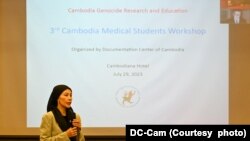Dozens of Cambodian medical school students gathered last month to learn how they can deploy their skills to help the millions of Khmer Rouge survivors still alive in Cambodia, many of whom are struggling with mental and physical health problems.
The Documentation Center of Cambodia (DC-Cam), a leading archival and support organization for Khmer Rouge survivors, organized the workshop in Phnom Penh on July 29 to develop leaders in the health field and highlight the positive contributions they can make working with elderly Cambodians.
Sari Amira, a nursing student from Norton University in Phnom Penh, told VOA Khmer that she appreciated the opportunity to learn more about the life of Khmer Rouge survivors, and pitied those who are still struggling with the mental scars from the genocide.
“After this workshop, I will apply the knowledge I gained today in the healthcare profession and share it with friends who did not attend today,” Sari Amira said.
Although 30 years have passed since relative peace returned to Cambodia in the early 1990s, there remains pervasive shortages in health care access across the country, particularly in rural areas where many Khmer Rouge survivors live. Scarce mental health resources are stretched particularly thin, despite widespread trauma that has been handed down through the generations.
Sari Amira explained that the workshop provided her a new understanding of how doctors can communicate effectively with patients, and highlighted the main illnesses — mental and physical — facing Khmer Rouge survivors.
“I think this workshop is good for me. I have learned a lot such as changing behavior to build trust from patients,” she said. “I also understand how to work professionally, how to communicate with the patients ethically and the 10 main diseases and illnesses that most often occur with Khmer Rouge survivors.”
DC-Cam’s third workshop on “Advancing the rights and improving the health conditions of Khmer Rouge survivors” was joined by 40 students from various medical schools across the city.
It followed a nationwide survey in which the organization spoke to some 32,000 survivors in less than a year. DC-Cam volunteers identified 10 chronic illnesses among survivors — hypertension, stomach ailments, malaria, mental illness, cardiovascular disease, joint disorders, severe asthma, diabetes, tuberculosis and leprosy.
Hong Pengky, 19-year-old laboratory student of Chenla University, said he felt inspired to help bring health care to the millions of survivors who desperately need it.
“For effective treatment, we think that in remote areas, there is no hospital near most houses, so we [medical care providers] need to go to those areas. We have to give them advice, to help and tell them how to take care of themselves,” Pengky said. “We can volunteer to help treat them or we can inform…other volunteer doctors who are interested to go and help.”
So Farina, DC-Cam’s principal deputy director, told VOA Khmer the organization hoped the medical students would take a leadership role in treating Khmer Rouge survivors, understand how to engage with the older patients and recognize their health conditions.
“We also focus on changing attitudes,” she said, “because we see that there are many factors that contribute to health care such as health problems, resources, surrounding environment and showing them how to prepare and become a good doctor,” she said.
The problems facing these patients often run deep. “There is trauma due to various issues of that generation — work exhaustion, as well as the killing of their family members or what they have seen,” she added.
She said that DC-Cam will conduct the fourth workshop on August 19 to help broaden the medical students’ knowledge on Khmer Rouge survivors’ health conditions and strengthen their leadership and compassion toward survivors or patients.
DC-Cam has been investigating Khmer Rouge atrocities and working with survivors for nearly two decades. The health care project launched in 2021 and connects young volunteers with survivors across the country to document their stories, respond to health surveys and provide access to medical care in 48 clinics across the country.
Many survivors of the regime hoped that the Khmer Rouge Tribunal would require the government to provide medical care as part of reparations awarded to “civil parties” to the trial. However, as the tribunal wrapped up last year it became clear that many of their health care needs would remain unmet.
The tribunal argued that “it cannot impose legal obligations on the Cambodian Government, and that the Court lacks the resources to fulfill such obligations,” Michael Karnavas, a former criminal defense lawyer at the tribunal, wrote in a research paper.
The workshop featured a number of expert speakers. Dr. Demosthenes C. Reyes, who provides medical services for DC-Cam’s Advancing the Rights and Improving the Health Conditions of Khmer Rouge Survivors program, told the medical students that being honest to patients is a key to building good relations and trust.
“So as a doctor, you need to fight for the truth and the right treatment,” Dr. Reyes said. “If you're not sure, give it to somebody else who is actually expert on this, but if you can do it, do it because it's the right thing to do.”









